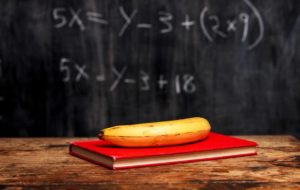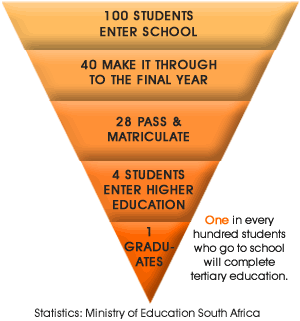Matthew Savides | 06 June, 2017 16:20

Maths
Image by: Gallo Images/ Thinkstock
Every day‚ tens of thousands of school children are being taught by teachers who aren’t qualified to do the job.
The result is that pupils are “not receiving the quality of teaching they’re supposed to be getting”‚ the South African Democratic Teachers’ Union (SADTU) has admitted.
And with mathematics and the sciences the subjects hardest hit‚ education authorities say the solution to the problem might have to come from outside South Africa’s borders.
Responding to a parliamentary question by the Democratic Alliance‚ the national education department recently admitted that 5‚139 teachers – the vast majority of which are in rural KwaZulu-Natal‚ which stands at the heart of the problem – are either unqualified or under-qualified.
Cape Town principal vetoed after claiming wearing a hijab during Ramadan is not compulsory
While this was an improvement from 2014 (6‚719 teachers) and 2015 (6‚030 teachers)‚ it is still a worrying situation.
There are‚ according to a 2016 statistical study released by the education department‚ about 435‚000 teachers across the country.
In the response to the DA‚ the department’s revealed that‚ in 2016:
KZN had 2‚875 unqualified or under-qualified teachers last year‚ 57% of the total number of such teachers across the country;
The Northern Cape had the second most‚ with 400 teachers; and
Limpopo was best off‚ with just 15 teachers.
The response also showed that five districts across the country had more than 200 unqualified or under-qualified teachers: eMtshezi (231 teachers)‚ Paulpietersburg (228 teachers) and Ixopo (219 teachers)‚ all in KZN‚ and Ngaka Modiri Molema (218) and Dr Ruth Segomotsi Mompati (201 teaches)‚ both in the North West. Figures for individual districts in the Free State were not provided.
School uniform investigation hots up
“The subjects most affected include mathematics‚ sciences and technology at all levels‚ and African language teaching‚ particularly at foundation phase.
“The focus of the department‚ at a national level‚ is to address the supply of educators through various initiatives. These include the Funza Lushaka Bursary Scheme‚ which focuses on mathematics‚ sciences‚ technology and African languages‚ and the appointment of foreign educators qualified to teach scarce skills‚” the response reads.
Newly appointed DA shadow education minister Ian Ollis said the implications of situation were severe.
“This means that‚ every day‚ teachers stand in front of a class without the necessary skills to teach the subject that they are teaching. It is simply wrecking the futures of children who have to be taught by teachers who are not qualified‚” he said.
For him‚ the solution lay in specialist facilities for new teachers.
“We need teacher colleges urgently reintroduced. On the job management for school principals and subject training for the under-educated teachers [is also needed]‚” said Ollis.
The party’s KwaZulu-Natal education spokesman‚ Rishigen Viranna‚ lashed out at the KZN education department over the situation – particularly taking aim at how the poorer‚ more rural‚ parts of the province were worst hit.
“Without a quality education in the gateway subjects of Mathematics and Science they are destined to remain trapped in the cycle of poverty. The DA believes firmly that there is no better teaching tool than trained teachers in classrooms when it comes to properly educating learners‚” he said.
He added that he would request that the situation be urgently discussed at the KZN Legislature’s next education portfolio committee meeting.
SADTU general secretary Mugwena Maluleke said the problem was not that teachers weren’t qualified‚ it was that they were being made to teach the wrong subjects.
“The problem is now you allocate the teacher‚” he said. “You get teachers who are qualified to teach a subject‚ they are they allocated to a different subject. The issue is misallocation of resources.”
Maluleke said that this was largely because of a change in syllabus‚ with teachers not being property trained to meet the new requirements and criteria.
Agreeing with Ollis‚ he said the solution was to re-establish specialist teacher training facilities‚ much like dedicated medical schools.
“There need to be dedicated colleges for education. Universities…given you theory and not teaching practise. We also need more teacher development for those who are in the system. An international norm is that teachers must spend 120 hours [a year] on teacher development. We are living in a changing world‚” he said.
The education department did not respond to questions sent on Tuesday morning.
KwaZulu-Natal education department spokesman Muzi Mahlambi said that one of the biggest problems was attracting teachers to rural parts of KZN.
“We were forced to engage the services of unqualified educators‚ some of whom would have degrees but would be referred to as unqualified because they did not have teaching methodology. Post-1994 we referred to them as unqualified protected educators. They were given grace to develop themselves in terms of obtaining qualifications. Many have qualified.
“It would be critical to mention that these educators did a great job for African rural township children during apartheid. Today many of the children are highly educated people and are contributing a lot to our communities. We now have an over supply of qualified educators‚ some we are unable to absorb due to their specialisations that are not in demand in our schools‚” he said.
– TimesLIVE
http://www.timeslive.co.za/local/2017/06/06/South-African-schools-have-5‚139-teachers-who-are-unqualified-or-under-qualified

